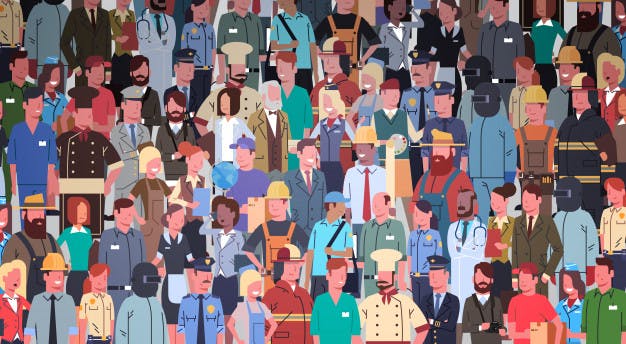5800 students unlocked their dream jobs with UG/PG programs in top colleges. Apply Now!
The workplace has taken a big hit due to the pandemic. Age-old practices have gone out of the window and been replaced by new solutions born out of necessity rather than innovation. Millions have lost jobs and countless others have had to adjust by working from home.
The magnitude of disruption has meant that everything from demand for labour, required skills, and occupation mix has undergone a paradigm shift.
In this article, we analyse the impact of the pandemic on the workplace and how it will shape the economy of the future.
Jobs Requiring In-Person Attendance Most Unsettled
Different industries require different amounts of physical proximity. It is no surprise that workplaces requiring mandatory physical presence such as hospitals, retail stores, banks, construction, and factories have been unsettled the most. These industries will see the most change post-pandemic and this will also have a domino effect on others as business models shift considerably.
For e.g.- there has been a sharp increase in the e-commerce sector as more and more people now prefer ordering groceries instead of physically going to the store.
On the other hand, the travel industry has been hit hard with hotels and restaurants shutting down due to a lack of demand.
Meanwhile, occupations that traditionally have had low inter-personal interactions such as transport have not been impacted as much.
Remote Work In Some Industries Here To Stay
With remote work becoming the new norm, virtual meetings are commonplace now. This trend is expected to continue even after the pandemic, although less intensely. According to McKinsey’s research, 20-25% of employees in the tertiary sector could work from home 3-5 days a week even after the pandemic. This figure is 4-5 times higher than before the pandemic.
This could spark geographical changes as well, with companies looking to reduce their office space by up to 30% and employees looking to move out of the city into the suburbs. This will have knock-on effects on retail stores and restaurants as they will be met with reduced demands in office complexes.
Unlike the tourism travel sector, it is unlikely that business travel will pick up again, with industry leaders aware of the advantages of a virtual set-up. According to forecasts, 20% of business travel may never return.
The pandemic has also shown people the benefits of shopping online. E-commerce has grown up to 5 times faster during the last year and almost 75% of people that used this channel for the first time over the past year say they will continue using it even after the pandemic.
Faster Adoption Of Automation and AI
In a survey of 800 senior executives, two-thirds said they are stepping up investment in automation and AI. This is especially true in industries that require physical proximity. Machines are taking the place of humans in warehouses, stores, call centres, and factories, and the pandemic has further accelerated the process.

Occupation Mix Might Shift With Low Wage Jobs Seeing Less Growth
A vastly different occupation mix might emerge once the pandemic dies down. Before, the majority of job losses were concentrated in the middle-income group, with low and high-income jobs seeing growth. Now, it’s the low-wage jobs that are in danger of being left obsolete. It is predicted that the majority of demand will happen in high-wage jobs now.
This augurs well for highly educated workers such as MBA grads and STEM professionals, with these professions expected to see more job opportunities.
On a grimmer note, more than half of low-wage workers might have to learn new skills and shift occupation in order to survive in the near future.
More than 25% of people may need to switch industries. This is because the nature of skills required in the near future will be very different to what was required before the pandemic.
Researchers say that 1 in every 16 workers will need to find a different occupation by the end of the decade in the current scenario. This is a lot more than foreseen before the pandemic.

Governments and Corporates Can Help People
Governments and employers can work together and support workers who will be forced to transition into new roles. They can do this in many ways-
- By retaining workers and not laying them off.
- Using remote work as an opportunity to hire talent from different locations and not just the big metropolitan cities.
- By developing a robust digital infrastructure. In a developing country like India, the majority of households still lack access to the internet. Governments should aim to get everyone under the umbrella of the digital revolution so people get access to more opportunities.
Conclusion
Normally, global workplace practices change gradually over the years. However, the current situation isn’t normal. The pandemic has suddenly changed everything and forced governments, corporates and people to re-evaluate the workplace.
With remote work, virtual meetings and automation becoming the new norm, it is no surprise that the workplace of the future will be very different to the one we were all used to before 2020. The new decade has brought with it a new way of working and there’s no point fighting it, we all need to adapt and welcome the new trends in order to thrive.
If corporates, governments and people work together we can usher in a more robust, progressive and equal workplace.
HELP

